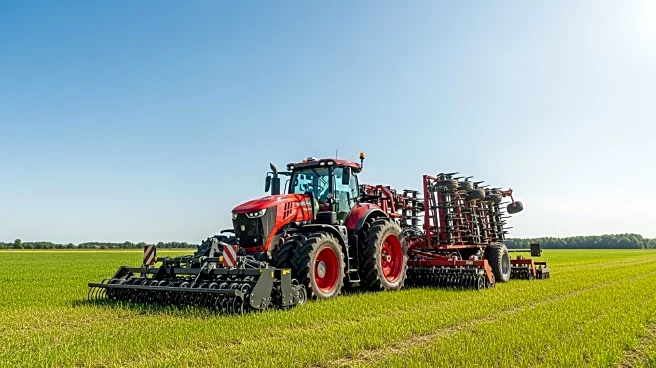What's Happening?
The United States agricultural implements market is anticipated to grow significantly, reaching $26.01 billion by 2030. This growth is driven by increasing demand for mechanization in agriculture, aimed
at enhancing crop productivity and efficiency. The market encompasses tools, machinery, and equipment used in farming activities, including plows, seeders, harvesters, tractors, and irrigation devices. The report by DataM Intelligence highlights the integration of precision agriculture technologies such as AI, IoT sensors, drones, and autonomous machinery, which are transforming farming operations. These advancements are improving efficiency and productivity while addressing labor shortages. The market is also influenced by sustainability and environmental concerns, with a rising demand for eco-friendly farming practices. This includes the adoption of conservation tillage implements and electric and solar-powered irrigation systems.
Why It's Important?
The projected growth of the agricultural implements market is significant for the U.S. economy and agricultural sector. As mechanization increases, it supports modern agriculture by reducing manual labor dependency and enhancing productivity. This growth is crucial in addressing the challenges posed by rising food demand and population growth, necessitating enhanced crop yields and resource optimization. The adoption of advanced technologies in farming not only boosts efficiency but also supports sustainable practices, reducing carbon footprints and promoting soil health. Key players in the market, such as AGCO Corporation and Deere & Company, are likely to benefit from these trends, driving innovation and competitiveness in the industry.
What's Next?
The market is expected to continue evolving with technological advancements and increased adoption of precision farming tools. Government regulations and incentives may further encourage the adoption of sustainable farming equipment, integrating advanced GPS, IoT, and data analytics. As the demand for small, versatile tractors and automation grows, companies may focus on developing solutions that address labor shortages and sustainability. The market's expansion could lead to increased collaboration between technology providers and agricultural businesses, fostering innovation and efficiency in farming practices.
Beyond the Headlines
The growth of the agricultural implements market may have broader implications for rural development and employment. As mechanization reduces manual labor dependency, it could lead to shifts in workforce dynamics, necessitating new skills and training for workers. Additionally, the emphasis on sustainable farming practices aligns with global environmental goals, potentially influencing policy decisions and investment in green technologies. The integration of AI and IoT in agriculture may also raise ethical and privacy concerns, requiring careful consideration and regulation.








